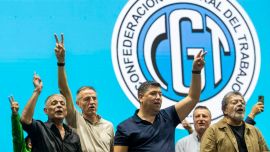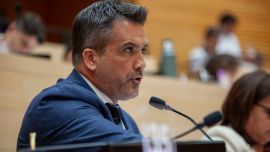There is one essential question which both the government and the opposition need to ask themselves: What does Argentina want from the world? It’s one that immediately gives rise to another chain question: How do they propose to get what they want? Unless this is formulated, it will be impossible for the country to take advantage of the opportunities within an international order in the making which will give nothing away. But it’s not enough to raise those questions. What’s also required is an in-depth analysis of what is happening beyond our frontiers, in order to take decisions which contribute to economic growth and the reduction of social inequalities.
In a bipolar international order marked by the strategic competition between China and the United States, where there is a transfer of power from the West to Asia and from states to non-governmental groupings (philanthropic billionaires, laboratories, terrorists, etc.), where the liberal democracies are undergoing a profound crisis of legitimacy, periphery countries need to maximise their opportunities and resist threats. Easy to say and much harder to do. A good start along that road would be to study the three most important bilateral relationships today for Argentina: Brazil, the United States and China.
After almost a year in the Casa Rosada, the news that Alberto Fernández and Jair Bolsonaro have communicated for the first time is undoubtedly welcome. It works against the national interests of both Argentina and Brazil if their leaders have no dialogue, running each other down instead. Argentina is Brazil’s third trade partner and Brazil Argentina’s second, besides being the main members of Mercosur. But “one swallow does not make a summer,” as the popular saying goes – it would not be reasonable to deduce that from now on the bilateral relationship will be a bed of roses. It is also difficult to think that pragmatism and maturity will reign.
Bolsonaro is a chameleon who adapts to circumstances. His camouflage always has to do with his domestic electoral needs, transferred to foreign policy. Over and above the undoubtedly good offices of Ambassador Daniel Scioli, the Brazilian president tactically acceded to a dialogue with Alberto Fernández for two reasons: first, his main international ally, Donald Trump, will be out of power next month; and second, he is having a difficult time of things with China, his main trade partner.
As Harvard University Professor Hussein Kalout recently explained to Perfil, Bolsonaro mints votes by confronting other countries, among them Argentina. His foreign policy seeks to mobilise his electoral base. Everything points to his seeking re-election in 2022, and the tensions surfacing again – if they do not do so in a shorter term. With Bolsonaro in with the habit of using Argentina as the new Venezuela – “Vote for me or we’ll be like Argentina” – and Fernández meddling in Brazil’s domestic affairs, repeatedly calling for Luiz Inácio Lula da Silva’s release and questioning his neighbour’s judicial system, it becomes impossible for the relationship to be pragmatic. On the contrary, everything indicates that Monday’s call was an impasse, taking a break in an absolutely ideological relationship. Yet setting aside the differences, as Fernández requested yesterday, seems improbable.
Those tensions on the horizon oblige Argentina to take a decision regarding Brazil. If the government opts for preserving the strategic alliance between Argentina and Brazil come what may, and thus also Mercosur, it will have to swallow countless bitter pills stoically until Bolsonaro leaves the Palace of Planalto (at the start of 2023 or 2027). Not doing so would imply breaking definitely with Brazil and the regional bloc, with all the risks and vulnerability which that decision would carry. A context of competition between China and the United States urges a more sustainable strategy than the "Pimpinela diplomacy" of Fernández and Bolsonaro singing against each other via Zoom.
Once the Bolsonaro enigma is resolved, Argentina will have to work out how to gain the support of Joe Biden, and with it the board of directors of the International Monetary Fund (IMF), in order to clinch the debt rescheduling it so yearns for. The key there will be Argentina’s position on Venezuela’s humanitarian crisis. Defending human rights implies at the very least criticising the régime of Nicolás Maduro at a time when the prosecutor of the International Criminal Court in The Hague, Fatou Bensouda, is making a preliminary analysis of whether crimes against humanity have been committed.
The government’s strategy will not work without consensus within Frente de Todos. If government officials continue departing from the script, as the ambassador to the Organisation of American States (OAS) Carlos Raimundi recently did, it will be hard for Fernández to convince Biden that Argentina is worth backing.
The link with China seems simpler at first sight but in reality contains multiple challenges. The Asian giant is a leading trade partner and supplies crucial dollars that enable macro-economic stability. Yet at the same time this bilateral link is forcing Argentina’s economy back into primary products and weakening intra-industrial connections with Brazil. Furthermore, the government faces a vulnerable situation given the competition between the superpowers in the region since Argentina cannot afford the luxury of antagonising China but nor can it reach a military or security agreement with Beijing which would set alarm bells ringing in Washington, as University of Chicago Professor John Mearsheimer told Perfil.
Returning to our starting-point, the Gordian knot for Argentine diplomacy consists of reaching long-term agreements with Brasilia in order to face the Sino-American dispute from a position of greater strength. Among other things, both countries should decide what to do with 5G. Can a common strategy be agreed with Bolsonaro, so that both partners can use the same telecommunications infrastructure? And if not, can the bureaucracies of both countries make up for the lack of sync between their heads?
Francisco de Santibañes, the secretary-general of the Argentine Council of International Relations (CARI) and a Global Fellow of the Wilson Center, wrote recently that Argentina “needs a strategy based on a correct understanding of what is happening in the world.” For that it is not necessary to have a US-style ‘grand strategy.’ You just need a clear idea of the best way to link up with an international order which is increasingly conflictive, volatile and uncertain.




















Comments